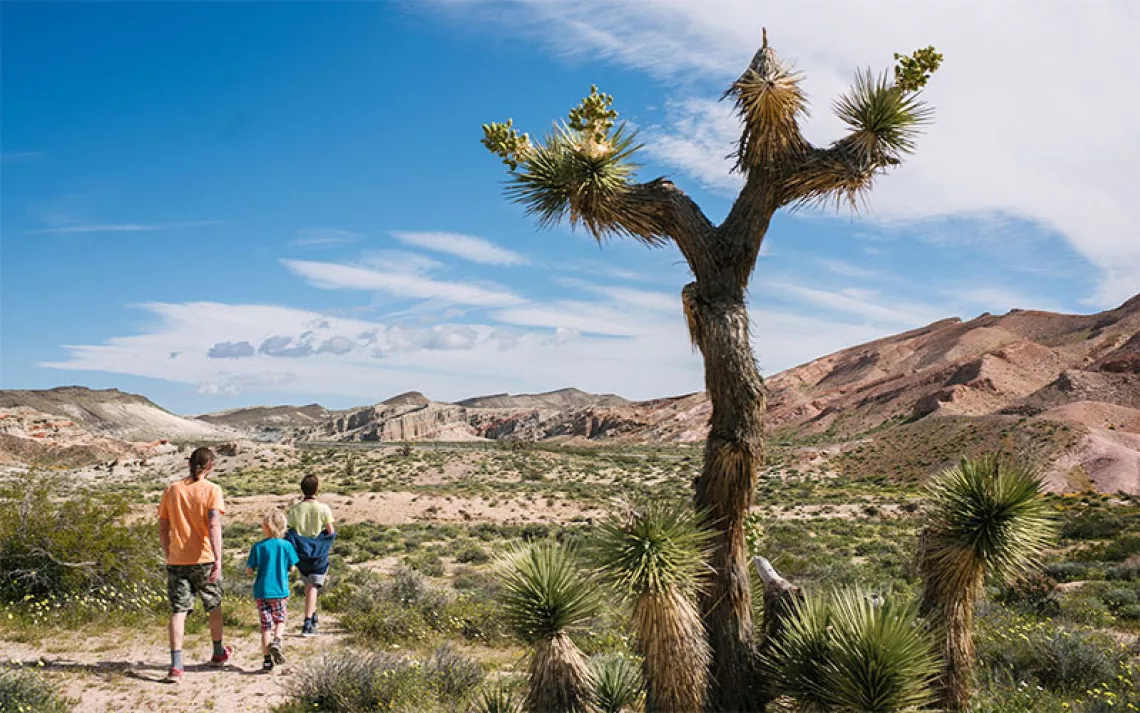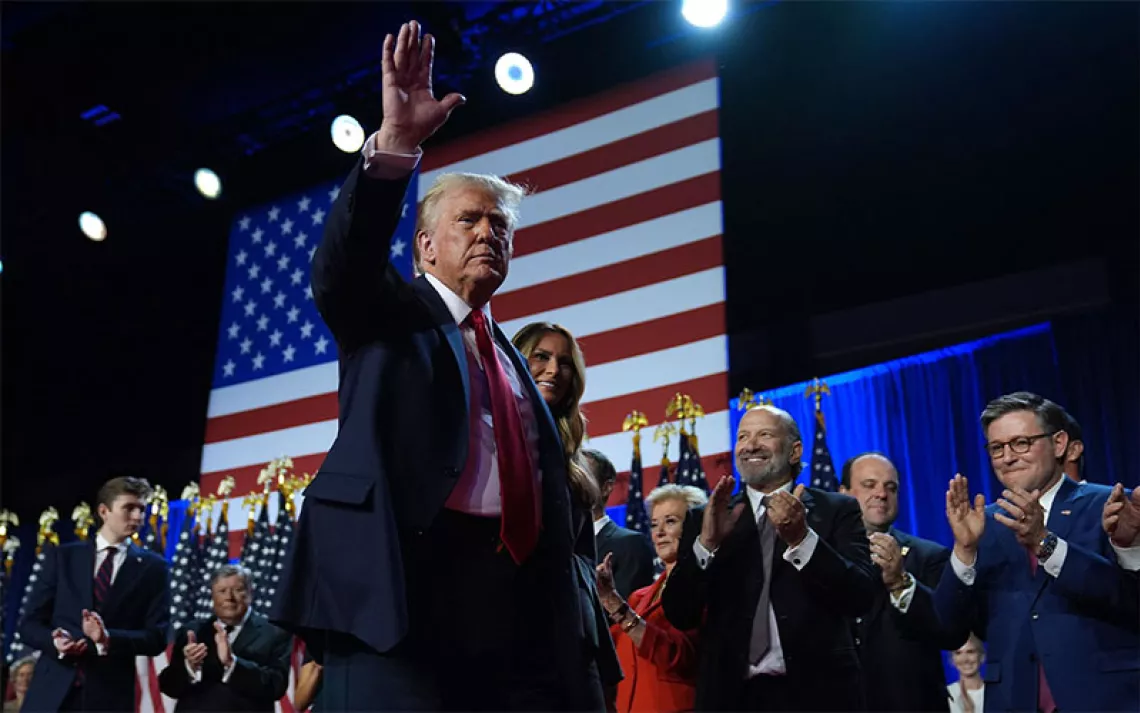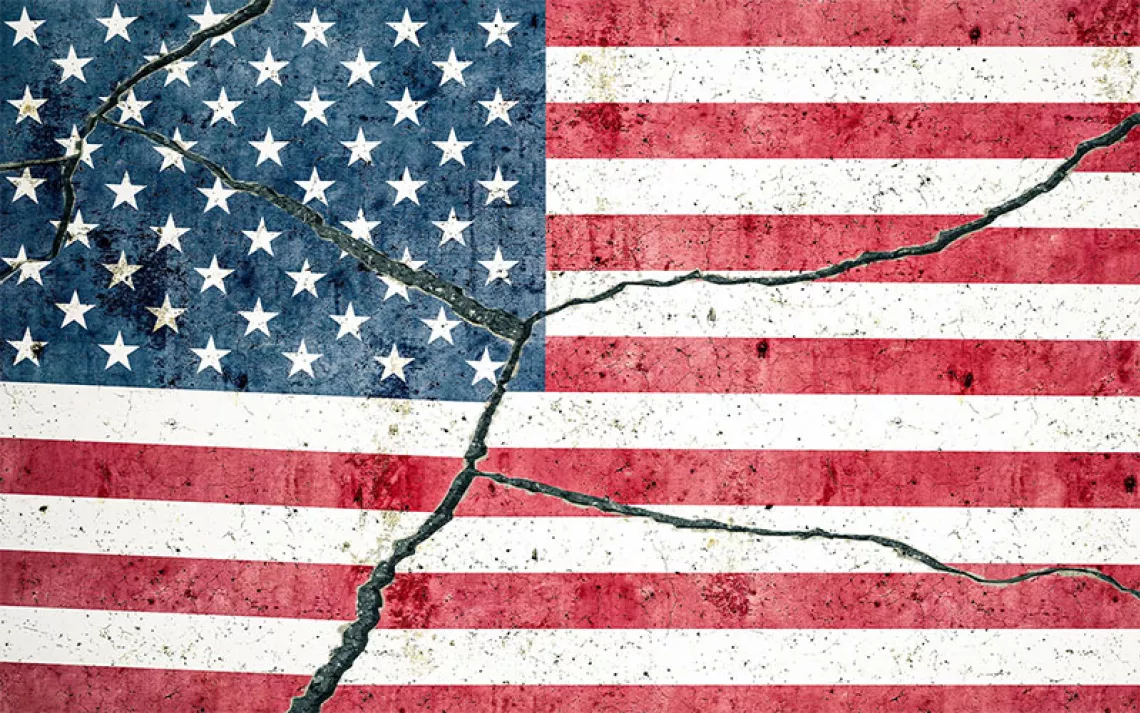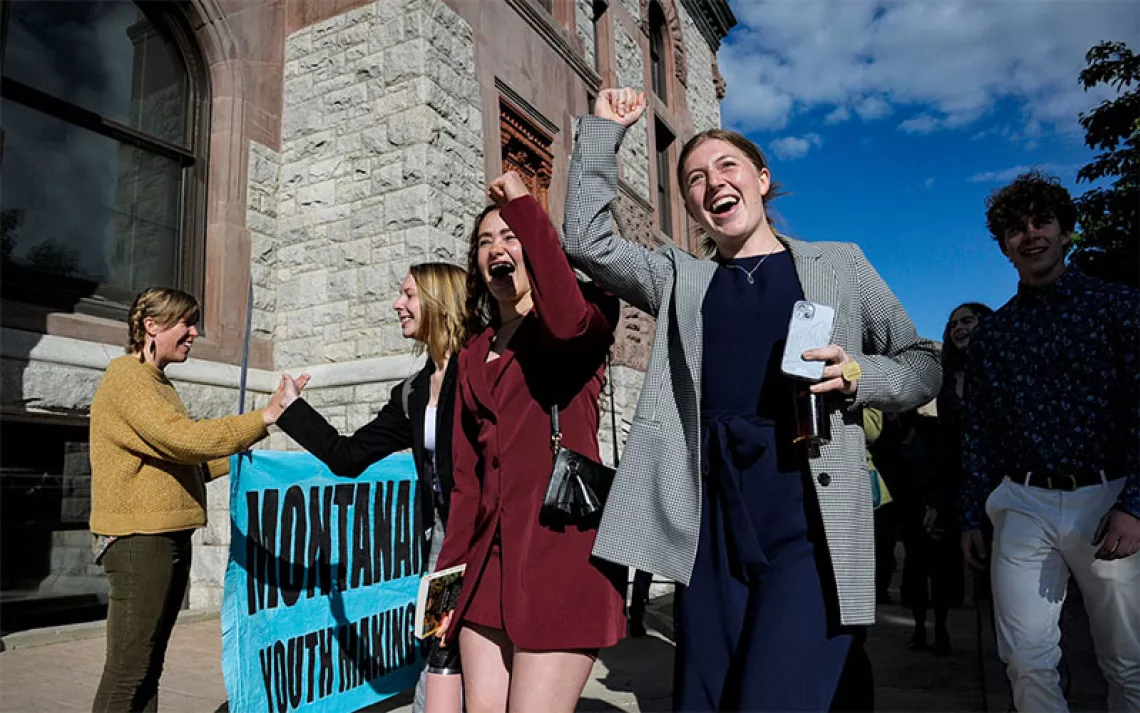Under Cover of COVID
Trump is using the pandemic to bail out his fossil fuel friends

A protester calls for an end to Pennsylvania's shelter-in-place order in April 2020. | Photo by Mark Peterson/Redux
President Donald Trump is famous for scorning anything connected to his predecessor, but he has heeded the advice of Barack Obama’s chief of staff Rahm Emanuel: “You never want a serious crisis to go to waste.”
While the United States is reeling from the effects of the deadly coronavirus, the Trump administration is taking advantage of a distracted nation to doggedly pursue pet policies, particularly those that benefit the fossil fuel industry and friends of the president—two groups that have substantial overlap. In the administration of public lands, environmental regulation, and federal bailouts of foundering industries, Trump continues to punish his enemies and reward his backers, whenever possible in ways that cannot be easily overturned should he lose the election in November.
In late March, as the country started sheltering in place, the EPA officially rolled back its Obama-era fuel-efficiency standards for cars. Doing so was not on the auto industry’s wish list; it appeared to be motivated by Trump’s desire to overturn what had been a centerpiece in Obama’s response to the climate crisis.
Why the hurry in the midst of a pandemic? Trump knows that if he is not reelected and Democrats take the Senate, the Congressional Review Act allows the next Congress to overturn any rule finalized within the previous 60 legislative days. (Reversing earlier rules requires a lengthy rulemaking process.)
That political calculation has been at work in Trump’s management of public lands, also for the benefit of the fossil fuel industry. “They are trying to push through as many of these changes as they can so that they don’t run the risk of being overturned immediately by a future Congress,” says Aaron Weiss, deputy director of the Center for Western Priorities. “They are trying to rush the clock.”
The center has been cataloging pandemic sneak-arounds by the Interior Department. By late May, it had counted 74 damaging actions since Trump signed the first coronavirus emergency bill on March 6, most involving efforts by Interior Secretary David Bernhardt, a former oil and gas lobbyist, to make even more public lands available for drilling. The Trump administration moved forward with these actions despite pleas from senators in the West that “the agencies within the Department of Interior should be focused on how to bolster the response to COVID-19 in communities across America, not push through policy with limited public input.”
In New Mexico, for example, the Bureau of Land Management expedited new oil and gas leases near Chaco Culture National Historical Park, a site of great cultural and religious significance for the region’s Native American communities. While the Navajo Nation was being hammered by the coronavirus—its per-capita infection rate surpassed New York’s and New Jersey’s—BLM acting chief William Perry Pendley refused to extend the project’s public comment period, offering instead four “virtual public meetings’’ in a region with limited internet access. “Native Americans are contracting and dying from coronavirus at an alarming rate,” said a statement from Representative Raúl Grijalva, an Arizona Democrat who is the chair of the House Committee on Natural Resources. “The Trump administration should be working to make sure they have the resources they need to stop deaths, not keep drilling at record speed.”
Many of the rollbacks and revisions jammed through under cover of COVID-19 by EPA administrator (and former coal lobbyist) Andrew Wheeler have been intended to prop up the dying coal industry. The agency refused to tighten regulations on the fine-particulate matter, or soot, that is emitted from the smokestacks of coal-burning plants, even when a Harvard study showed an increase in death rates from COVID-19 in areas with sooty air. In April, the EPA lowered emissions standards for four coal plants in Pennsylvania and West Virginia so that they could burn cheap, low-quality coal and emit more toxic air pollution. And the agency is rushing to rewrite a 2012 rule that limited the amount of neurotoxic mercury and other poisons that power plants can emit.
The irony of the Trump administration’s forging ahead with favors for the fossil fuel industry during the pandemic is that one of the pandemic’s earliest victims was the fossil fuel industry. In spring, scores of tankers were moored off the nation’s coasts, the only place left to store the oil no one was using as travel ground to a halt. This glut, combined with the price war between Russia and Saudi Arabia, has devastated the US fracking industry. Similarly, reduced demand for nonresidential electricity has kayoed the already staggering coal industry. One desperate coal exec even suggested rebranding the stuff as “carbon ore.”
Trump was ready to ride to the rescue. “We will never let the great US Oil & Gas Industry down,” he tweeted on April 21. After considering a number of options—including paying US oil producers to keep it in the ground—his administration settled on letting the industry tap $200 million from the Main Street Lending Program to pay off loans incurred long before the virus appeared.
The coal industry also lined up for a bailout (and asked to be freed from responsibility for payments to miners with black lung disease). Three coal companies with connections to the Trump administration scored a total of $28 million from a fund Congress approved for aiding small businesses: $10 million for Hallador Energy Company, which hired disgraced former EPA administrator Scott Pruitt as a lobbyist; $10 million for Rhino Resource Partners, whose former chief Trump nominated to head the federal Mine Safety and Health Administration; and $8.4 million for Ramaco Resources, whose CEO sits on Trump’s National Coal Council. No amount of cash injections, however, can save these dying patients, whom this terrible pandemic may finally finish off.
 The Magazine of The Sierra Club
The Magazine of The Sierra Club



